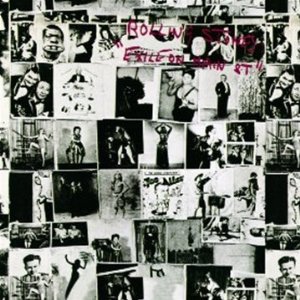
Universal Music Group
Well, there you go: it’s the end of an era, boys and girls. The fat lady has sung, threw up, and nodded out. It’s a done deal.
Let’s have a few moments of silence, shall we?
Sit yourself down and reflect on this fact: after nearly four decades of referring to any album that combines elements of rock, country, blues, and gospel, roughs up their edges, and adds a swagger and a stagger (and makes the whole works sound like it was recorded sometime between midnight and 4:00 AM) as being “Stonesy” or “Exile-like” – music scribes all over the planet have been trumped.
By the goddamned Rolling Stones themselves, no less.
Yep – that’s right. Who’d have thought that when it came to sealing the deal on Exile On Main Street comparisons for now and evermore that the Stones themselves would pull it off? Who saw it coming?
What we have here, you see, is the new dee-lux edition of Exile On Main Street, offering not only the original 18 songs freshly remastered, but 10 never-officially-doled-out-before tracks as well. (An obsessive-compulsive SUPER dee-lux edition also includes a vinyl version of the album, a documentary DVD, and a big ol’ walloping two-handed picture book chock full of scenes from the Exile era.)
(NOTE: And just in case you boys and girls think we reviewers get all the good stuff, I want you to know that this here piece was generated from nothing more than a streaming link that only allowed four [4] log-ins – and no downloads. And you couldn’t just hit “play” and let the thing roll, either – you had to manually mouse around and select each track, being careful not to accidentally log yourself out. But here’s the real kicker: get a phone call or take a bathroom break or acknowledge the outside world in any way and – BING! – “Your session has expired.” Talk about maximum security. So why did I put up with this obvious statement about my untrustworthiness and lack of responsibility? Because I love you, that’s why.)
The remastered original album is good. Is it worth throwing your old copy away for? No – but it sharpens things up a whisker without making them shiny or glossy or any of the things that the “ Exile sound” hasn’t meant for the last 38 years.
No – where the Stones have managed to pull the real coup is on the 10 bonus tracks, a crusty mix of alternate takes, demo passes that evolved from there, and stuff that never made it out of the basement of Villa Nellcote, Keith Richards’ lair in southern France back in 1972.
Don Was, the master of catch-the-emotion-of-the-moment-and-nail-it-to-the-wall production, was brought in to help whip the new/old tracks into shape, and oversee Jagger and Richards new overdubs on the old material. And for the most part, things retain that midnight-in-the-cellar vibe just fine. (Was was the right man for the job, showing respect for the dank mold that made this stuff taste good in the first place and knowing that it shouldn’t be scraped off.) Plus, there are still plenty of traces of the late Jimmy Miller’s production brilliance from the original sessions – everything from touches of just-right percussion to right-here sonic thickness. It’s up for debate as to how much new stuff was added by Jagger and Richards to fill out the tracks; no doubt, the present-day Mick sounds different than the 1972 model, but the vibe and the groove remain. In the end, I’ll take Keith Richards’ word for it: “When I cut new parts, I was just trying to stay out of the way of the tracks. I stroked an acoustic here and there, but I didn’t want to interfere with the bible.”
So what do we have here?
We have reminders of what a damn good blues harp player Jagger is. Check out his grunting, sweating, sultry solo on the Latin-flavored “Pass The Wine” – or the total horndog bump-and-grind of “I’m Not Signifying”. (The latter features a total blow-yer-lungs-out break by sax player Bobby Keys and Jim Price on trumpet.)
There’s the brilliance of guitarist Mick Taylor, whose sweet and melodic lines on “Plundered My Soul” define the yin/yang of his style vs. Keith Richards’ crunchier grooves … a study in contrast, yet a perfect fit at the same time.
Or how about the usually-unsung pianists who helped shape the Stones’ sound? Fans of the early days of Steve Kimock and Zero will remember the late Nicky Hopkins’ knack for playing as nasty or as grand as the moment warranted. Hopkins is all over the bonus cuts on Exile, laying down everything from barroom romp as needed to the beautiful cascades of “Following The River”.
There are moments of “Wait – isn’t that …?” that turn out to be something else. When “So Divine” begins, you think, “No, no, Keith – that’s the intro to ‘Paint It Black’!” But as the tune develops – snake dance sax, vibes, and all – the guitar lick takes on its own life. And there are familiar old friends: it really isn’t until you hit the first chorus on “Good Time Women” that you realize what you’re hearing is a stripped-down work-in-progress version of what was to become “Tumbling Dice”. An alternate take of “Loving Cup” stumbles and fumbles along drunkenly, totally sideways with ragged harmonies and jagged guitars – it’s a beautiful mess.
And, of course, there’s Mr. Richards, whose presence is felt throughout, from open-G riffs to gritty vocals. “Dancing In The Light” gives us classic Keith layered against himself, mock-steel bends and rhythm chunks on the Telecaster against an understrum of acoustic guitar. (Another great Stones piano man, the late Ian Stewart, is featured on “Dancing”.) Elsewhere, Richards leads the band through an alternate take of “Soul Survivor”, laying down an improvised-on-the-spot guide vocal whose reckless poetry captures the mood of the cellar that particular night.
Throughout it all, drummer Charlie Watts and original bassist Bill Wyman are solid and patient. They play to the vibe of the muse of the moment and act as the gardeners who know how to nurture while letting things grow at their own pace. There’s a short, sweet moment at the end of the bonus tracks called “Title 5” that finds Watts, Wyman, and Richards laying down a cool, rootsy boogie for the sheer fun of it. It’s less than two minutes long, but it’s one big smile the whole time – the groove and nothing but the groove.
The bottom line of all of this, of course, is that even The Rolling Stones themselves had to reach back into the catacombs in the cellar of Nellcote in order to sound like Exile-era Stones.
There’s a message there.



No Comments comments associated with this post